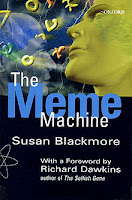In an evolutionary anthropological discussion of the origin of memes, over 2 million years ago in our hominid ancestors of the time, Blackmore considers that it would have been very difficult to know what memes to select for, from a point of view of the (selfish) genes. Once imitation of ideas (i.e. memes) existed in a population, they would spread and change host behaviour at a rate orders of magnitude more rapid than genes could hope to (through survival of the fittest individuals). Hence human genes only provide vague heuristics for meme selection (i.e. what things humans find intrinsically interesting/captivating). Here are some of apparently inbuilt selection criterion:
- Copy the most obvious memes (simplest, most fully understandable, least likely to be miss-copied).
- Copy the most popular memes (others finding it worthwhile indicates memetic usefulness, best not to be left out just in case).
- Copy memes for: sex, food, winning battles, gossip (each has strong genetic survival advantages for our social hominids).
Fashion sense, joke telling/humour, altruism, and religiousness are largely products of run-away sexual selection for mates that are good at spreading memes in general. This is due to the selection pressure applied by memes on genes, and appears to have had the same effect on hominid brain size as Peahen's sexual selection has had on Peacock's tails. But I digress; the point is that humans have these built in hot topics with universal appeal.
+ 'Pee Lady' (AKA Wendy Lewis): recently gained notoriety for urinating on a World War II memorial [1,2].
 |
| [From the Telegraph.co.uk] |






